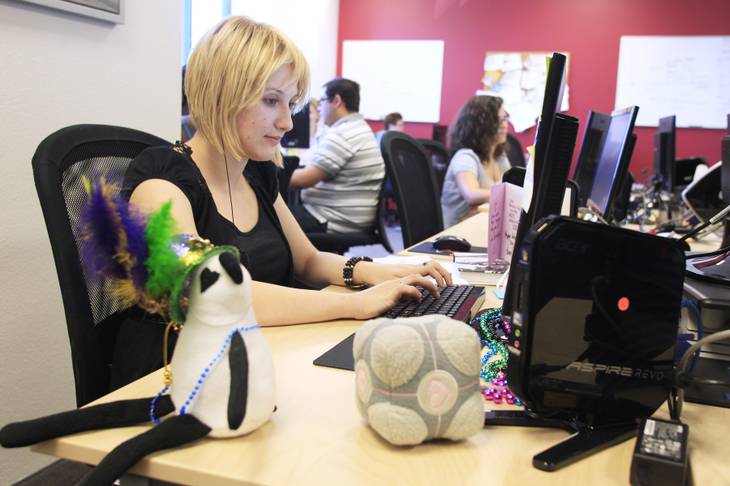
Claire Oshima, left, vice president of education for the Vegas Young Professionals Toastmasters club, speaks during a meeting in the Emergency Arts building downtown Monday, May 14, 2012. Toastmasters is an organization of clubs that encourage members to improve their public speaking and leadership skills.
Related Content
- Young veterans searching for work after serving the country deserve support (05-18-2012)
- New ‘super’ PAC hopes to woo younger voters (05-13-2012)
- Generation Y panelists say technology won’t upend convention business (01-13-2011)
- Las Vegas Advisor boss’ advice: Bring back the Baby Boomers (08-10-2011)
- Generation Y wants housing Las Vegas has in short supply (01-25-2011)
With graduations taking place across the country this month and next, a new wave of college students is preparing to enter the workforce.
But the job market those workers will encounter is drastically different than it was even five years ago.
Burdened with record levels of student loan debt, these young people will face stiff competition for fewer jobs and the prospect of lower starting salaries than their predecessors. They may have to take part-time work or a job in a field outside their degree. Many are moving back in with their parents while they look for work and staying even after they find employment in order to save money.
Those who do find jobs bring different ambitions and expectations of their careers than previous generations, which can lead to rifts in offices with older workers.
Raised by a legion of “helicopter parents” who shuttled them to after-school activities and pampered them with praise, members of Generation Y are unafraid to speak their minds, question authority or to switch jobs if it furthers their career, experts say.
Members of Generation Y, often referred to as “The Millenials,” also seek a deeper sense of meaning and fulfillment in their jobs and see less value in traditional 9-to-5 work schedules.
Although bringing younger employees into a workplace can cause conflicts, businesses that can engage their workers and take advantage of their passion, innovative thinking and familiarity with technology stand to benefit, said Alexia Vernon, a Las Vegas-based author and speaker who studies multigenerational workplaces.
As Baby Boomers continue to age out of the workforce and retire, it’s critical for businesses to develop their next generation of leaders and innovators, she said.
“Gen Y brings a lot of creativity and innovation to the table. We understand how to work well in groups,” Vernon said. “We are going to need Gen Y to step into leadership positions in our companies, and they need to get opportunities to develop those leadership skills.”
Meet the Millenials
Referred to by some as the “most coddled generation in history,” the Millenials grew up in an era of Oprah and the Internet and were taught that what they think and care about matters, Vernon said.
Roughly defined as including those born between 1980 and 2000, Generation Y is estimated to include about 80 million people, comparable in size to the Baby Boomers and about twice as large as Generation X.
Their unique upbringing means Millenials tend to be motivated by different things than older generations. Although raises and job titles are nice, young workers seek an opportunity to grow and develop in their jobs more than anything, Vernon said.
“The No. 1 reason why a Gen Y leaves work isn’t money; it isn’t for a better opportunity or graduate school. It’s feeling like we can’t learn and grow in our current role,” Vernon said. “There is that desire, and in many cases an expectation, that work is inherently meaningful.”
Six years ago, Jasmine Freeman packed up her family and moved to Las Vegas from the Midwest in pursuit of a new career, even though she admits she liked her old job at a bank.
“But there was this hole. Something was missing,” she said. “I’m looking for this total package. I don’t want to just be fulfilled in my family life. I don’t want to just be fulfilled in my work life. I want balance across the entire board.”
Freeman, 32, now is employed at Office Dynamics, a business training and development company in Las Vegas. She said she’d built a close relationship with her boss and co-workers there and felt like she was making a difference helping others.
“I’ve always felt loyal to companies I’ve worked for before, but I knew something was missing,” she said. “I knew that when I finally found that right fit, sticking around and being totally committed wouldn’t be a problem.”
Younger workers — often lacking the experience and seniority of older workers — have been battered by the recession and were often the target of layoffs, leaving them with less loyalty to a particular employer and more willing to change jobs or careers.
Christina Zila, 35, director of communications at Textbroker, has been laid off five times over the past several years. She said the turmoil changed the way she views her relationship with her employers.
“I can’t see my job as punch-in, punch-out anymore. I know I can get fired at any time, even if I’m doing a great job,” she said.
After starting with Textbroker, an article writing service, early in its history in 2009 and being given an opportunity to grow with the company, Zila said she feels more committed and more passionate about her job.
She said she thinks if young workers are engaged and made to feel a part of the company, they will bring an unmatched level of passion to their jobs.
“The majority of our workforce in our office is under 30, and I see that they’re very engaged,” Zila said. “And if you keep them engaged, they’ll go to the ends of the Earth for you. They’ll happily work from home on a Saturday. They’ll come into the office on strange days. They’ll use social media for your company’s advantage.”

Cort Arlint, an attorney and accountant, gives an impromptu presentation as he fills in for another speaker during a meeting of the Vegas Young Professionals Toastmasters club in the Emergency Arts building downtown Monday, May 14, 2012. Toastmasters is an organization of clubs that encourage members to improve their public speaking and leadership skills.
Spanning the generations
Young workers bring creativity and fresh energy to an office, but differences in the ways they communicate, view authority and prefer to work can cause friction, said Anne Hanson, president of Las Vegas-based business consulting firm CamCris Consulting.
To prevent conflicts and maximize the contribution of Generation Y workers, Hanson said businesses should be proactive, investing in training and giving regular feedback to ensure their young workers know what is expected of them.
“When (young workers) go into a workplace, they question what’s going on. They want to know, ‘Why I should I care?’ ‘Why should I buy in?’ so they can understand and be more committed,” she said. “To some, that’s seen as disrespectful, but it’s important to understand those different perspectives and communication styles.”
Millenials often prefer working in teams and want to have input on decisions that affect their company, Vernon said. Businesses can take advantage of that by using younger workers to help brainstorm and generate new ideas, even if they don’t end up using them.
Although they tend to prefer working autonomously, managers should still find ways to provide regular, informal feedback to younger employees, she said.
“It’s different than micromanaging. If they’re feeling stuck, find out how you can support them and how you can help,” Vernon said. “You want them to feel like you’re an ally versus a parent.”
At Textbrokers, Zila said the company spontaneously recognizes employees with awards and gifts and that its bonus system provides specific incentives for generating new ideas for the company.
The company also provides training that allows workers to advance and move between departments, she said, and gives them flexibility in where and when they work.
“It’s not just hours on a timesheet,” Zila said. “It’s taking a person’s likes, personality and attitudes into consideration and putting them in a spot where they’re happiest and therefore most useful to us.”
A fear of being replaced may keep older generations from sharing their institutional knowledge with younger workers, Freeman said.
“We see that battle every day at major corporations,” she said. “We talk with them about setting up succession plans and mentoring relationships to address that.”
Hanson said it was important for employers to be patient with their younger workers and not be afraid to try new approaches to reach their employees.
“Today, most of our workers are what you would call knowledge workers or service workers. They’re not production workers, so traditional management styles that we grew up with just won’t maximize the ability for those people to be creative and to make decisions on the fly,” she said. “It’s about going into it with an awareness, stepping back and realizing that although the person may not be a good fit right away, there is value in training.”

